Gambling Addiction Study Male & Female Differences
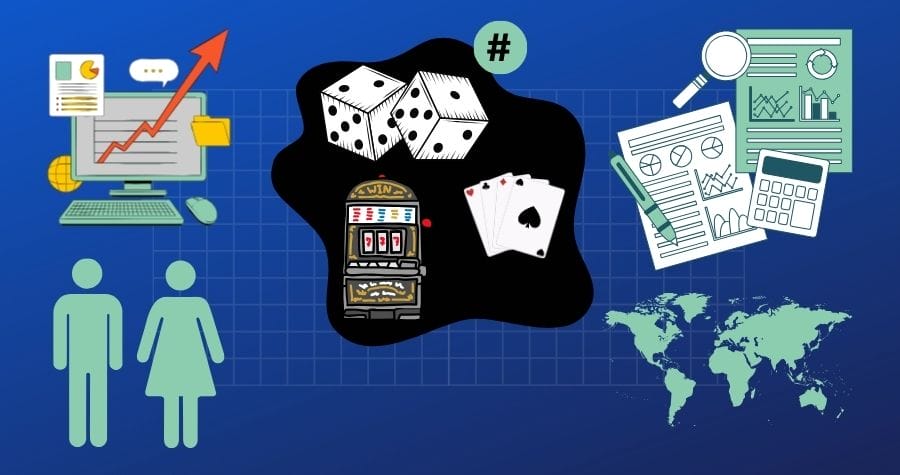
We asked 3320 gambling addicts about their gambling habits and what they struggle with. On this page, we show the results of a study where we compare the answers from male and female problem gamblers. If you want to know more, you can find the full study here:
The data was collected during the signup process for our members’ platform on QuitGamble.com. From June 2023 to January 2024, we received 3320 responses worldwide.
We made the study with the intention to better understand the needs of our members.
If you want to know more about the dataset or collaborate. Please contact Anders Bergman via support@quitgamble.com.
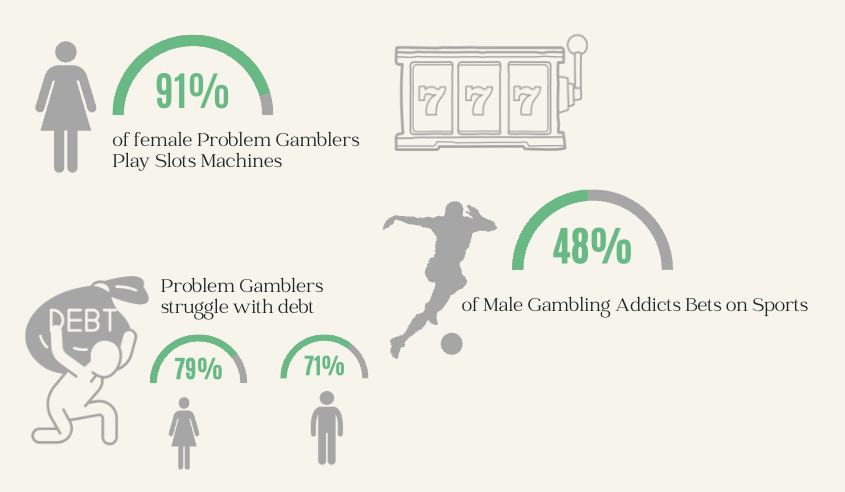
Key Findings
- 90% of female gambling addicts play slots compared to 64% male
- Both men (38%) and women (32%) struggle most with feeling out of control.
- 85% of male problem gamblers gamble online, and 69% among women.
- 48% of male and only 9% of female problem gamblers bet on sports.
- 24% of female gambling addicts gamble at land-based facilities only.
- Female gamblers struggle more with debt than males.
- 15% of male problem gamblers and 25% of females gamble to escape something.
- The main reason to gamble is “to win big” for both men and women.
- 69% of the people seeking help online are Male.
Data discussion
This analysis is based on 3,320 responses gathered from individuals applying for membership at QuitGamble.com, a support platform for those struggling with gambling addiction. We specifically focus on comparing male and female gambling addicts.
The responses come from users seeking assistance on QuitGamble.com, which serves as a community for individuals aiming to overcome gambling addiction. We have presumed that all respondents struggle with gambling addiction.
To verify that respondents are indeed facing gambling challenges, we initially asked how they intend to use the platform. Only the responses from individuals stating, “I want to stop gambling,” were included, amounting to a total of 3320 entries.
In conducting this targeted research on gambling addiction, it’s important to note that all participants provided their consent to share their data anonymously for research purposes. This consent was obtained in accordance with the Terms and Conditions agreed upon at the time of registration on QuitGamble.com. Such consent is crucial to our ethical approach to data collection, ensuring we respect user privacy while gaining valuable insights into gambling addiction. Our commitment to maintaining anonymity and confidentiality is central to our analysis, allowing us to enhance our understanding and support for individuals dealing with gambling addiction worldwide.
Why do Male and Female problem gamblers gamble?
One key to helping people stop gambling is helping them understand why they gamble. Our survey asked, ” What is the main reason you gamble? “The table below shows the differences between how men and women answered.
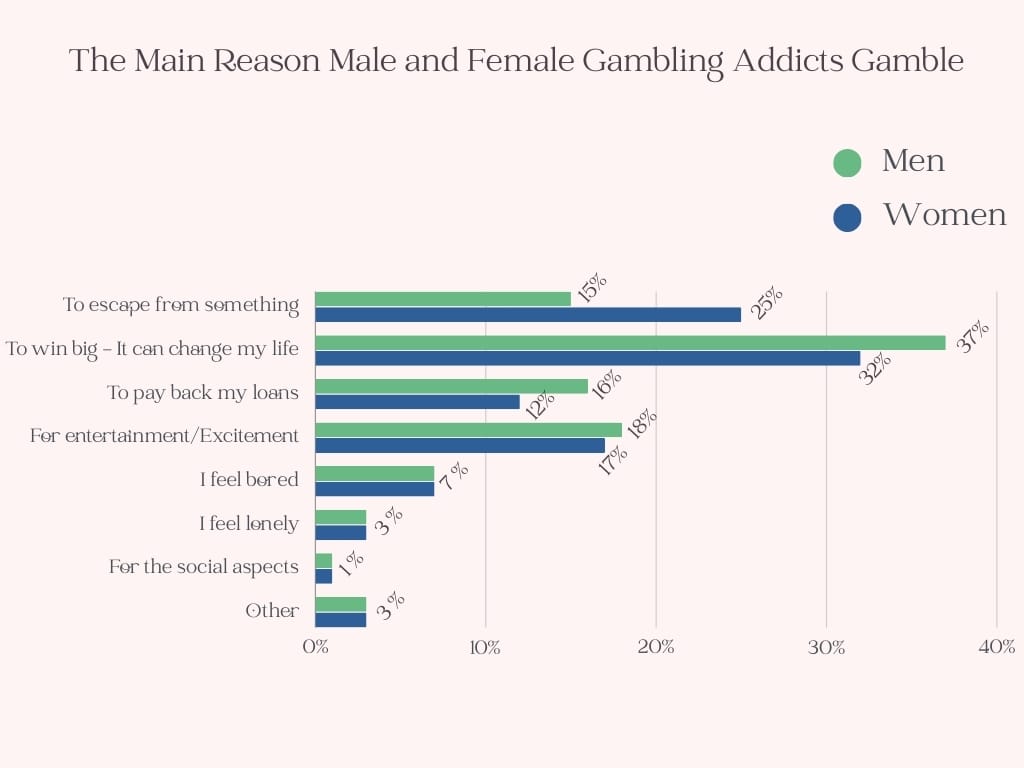
In general, the answers are pretty similar. The main reason why people are the same among men (37%) and women (32%) gamble to win big – it can change my life.
More men than women gamble to pay back loans. Among men 16% gamble to pay back loans, while only 12% among women do the same.
The biggest difference between men and women is gambling to escape. 25% of women gamble to escape something, and among men, only 15% gamble to escape.
The numbers for Entertainment (17-18%), loneliness (3%), boredom (7%), and others are the same for men and women. We discuss these numbers more in detail in the full global gambling addiction study.
—-
Comment: Only 3% say they gamble for an “other” reason. The number is the same for both sexes, which means that the seven alternatives cover 97% of the reasons.
It was interesting to see that there are only small differences between men and women regarding why people gamble. Women seem more aware of why they gamble, and it’s important that 25% of them already believe they gamble to escape something.
What do gambling addicts struggle most with?
To help someone, we need to know what they need help with. We asked our users what they struggle with most right now. The table below shows the results.
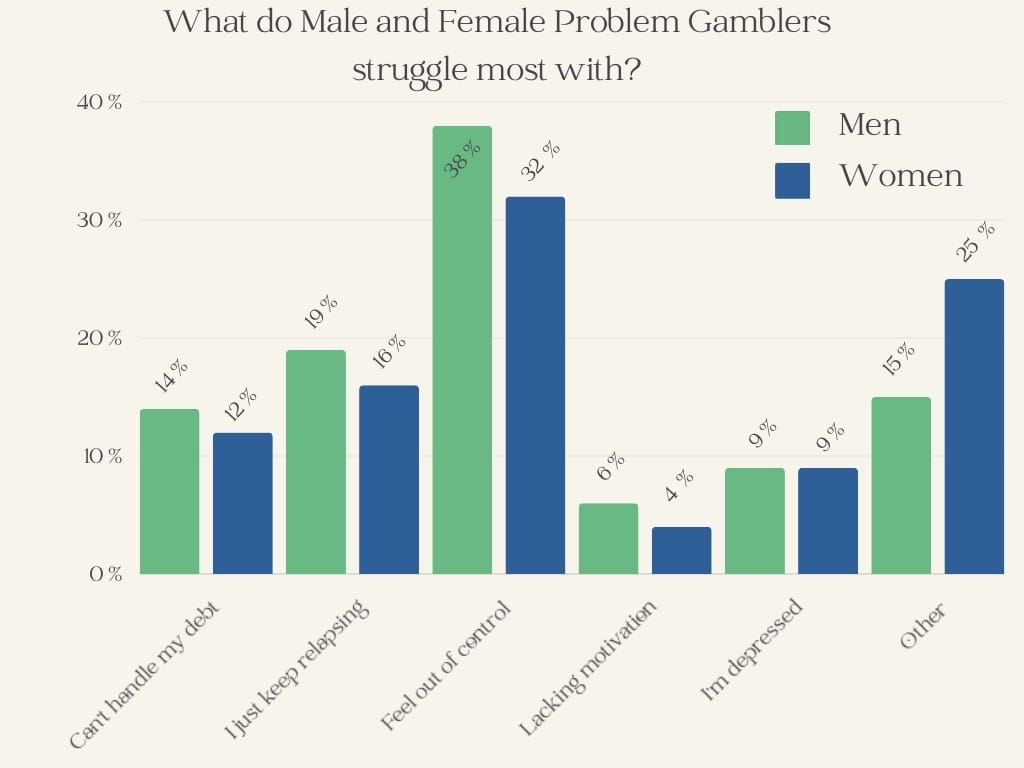
The most common answer was “feeling out of control“. Both men (38%) and women (32%) says they feel out of control and need more structure. The numbers for the other struggles are similar between men and women for most parts. The exception is “other,” which 25% of the women answered. It means that we have failed to identify some struggles women have to deal with.
Over 26% of the respondents answered “other, ” which indicates that we still don’t know what these people struggle with. In future research, we may introduce additional options or allow individuals to manually describe their primary challenges.
We elaborate further in the full global gambling addiction study.
Seeking help online vs Seeking help from physical treatment
Where are people willing to accept help for gambling addiction? Research indicates that 93% of Gamblers Anonymous members are male. In the UK, Gamcare noted that men constituted 70% of the National Helpline’s callers. Similarly, on QuitGamble.com, men make up 69% of its worldwide membership. On QuitGamble.com, 69% of the global members are men.
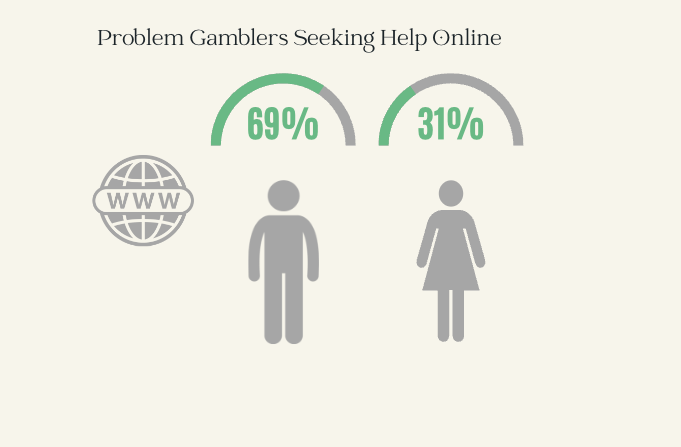
When we examined the data closer, we found that he sex ratio among our users changes for different age groups. The vast majority of the users under 50 years old are men, while there are more women than men after 50.
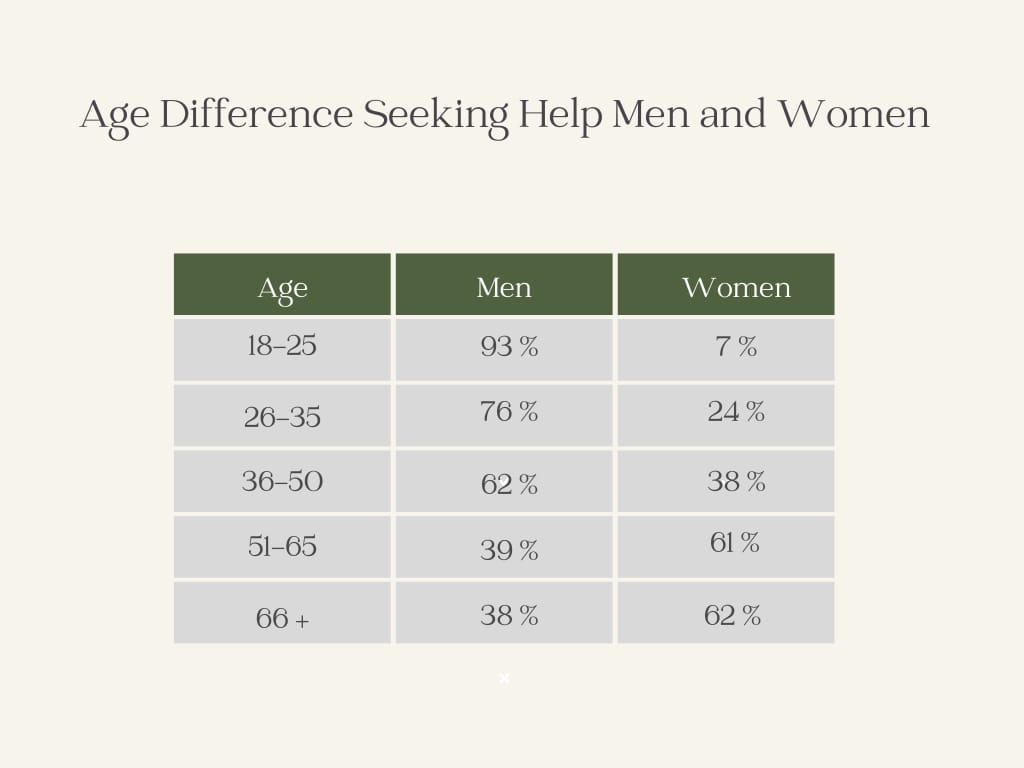
Where Do Gambling Addicts Gamble?
We asked, ” Where do you gamble? ” The options where online, landbased facilities, both or other. 85% of gambling addicted men gamble online, and 69% of the women. 40% of the female gambling addicts gamble on landbased facilities, and 24% on landbased facilities exclusively. Among men, 10% gamble solely on landbased facilities.
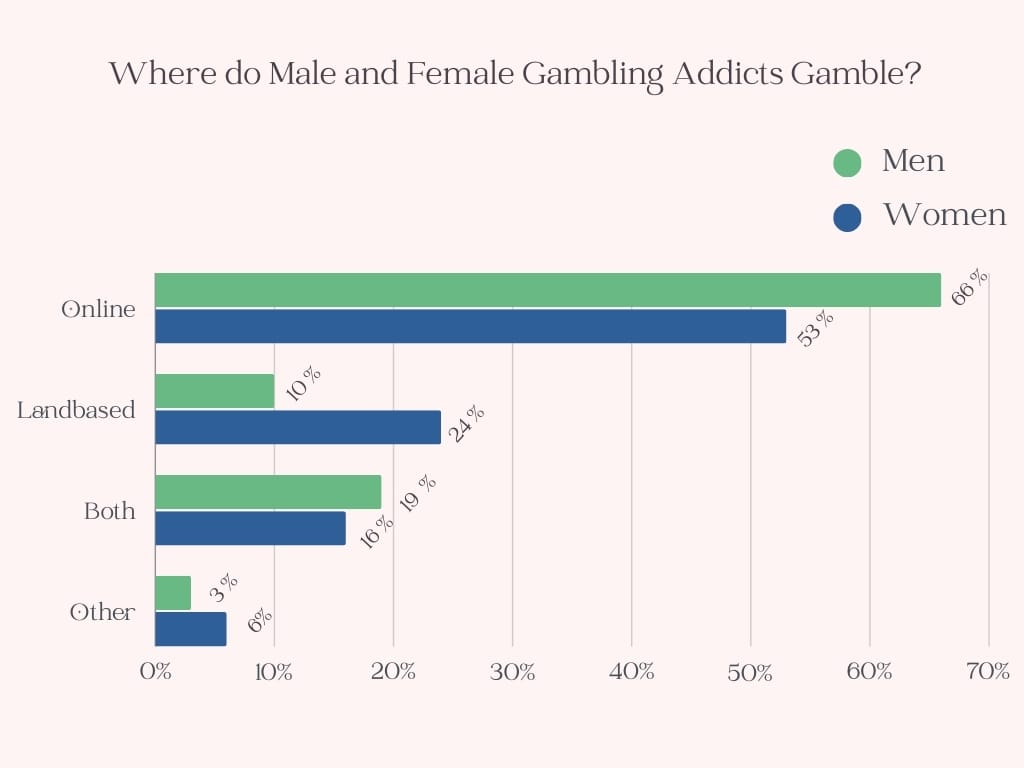
Gambling debt – Do you struggle with debt?
The financial consequences of gambling can be horrific, but how many gambling addicts have debt? Is there a difference between men and women? On average 73% our the respondent struggle with debt. 79% of the women and 71% of the men had gambling debt problems.
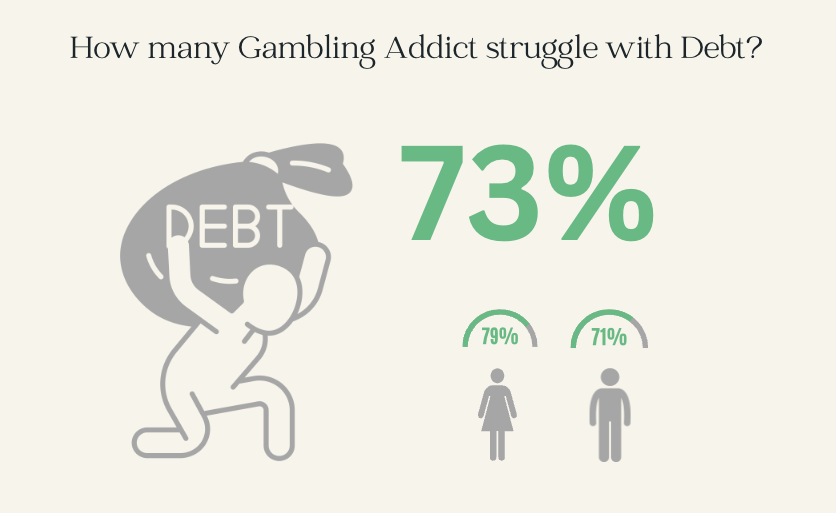
What male and female gambling addicts gamble on?
A method to determine the most addictive gambling activities involves querying addicts about their gambling preferences. We allowed respondents to select several options, acknowledging that a sign of gambling addiction is the tendency to gamble on numerous things. Are there any differences between what men and women gambling addicts gamble on?
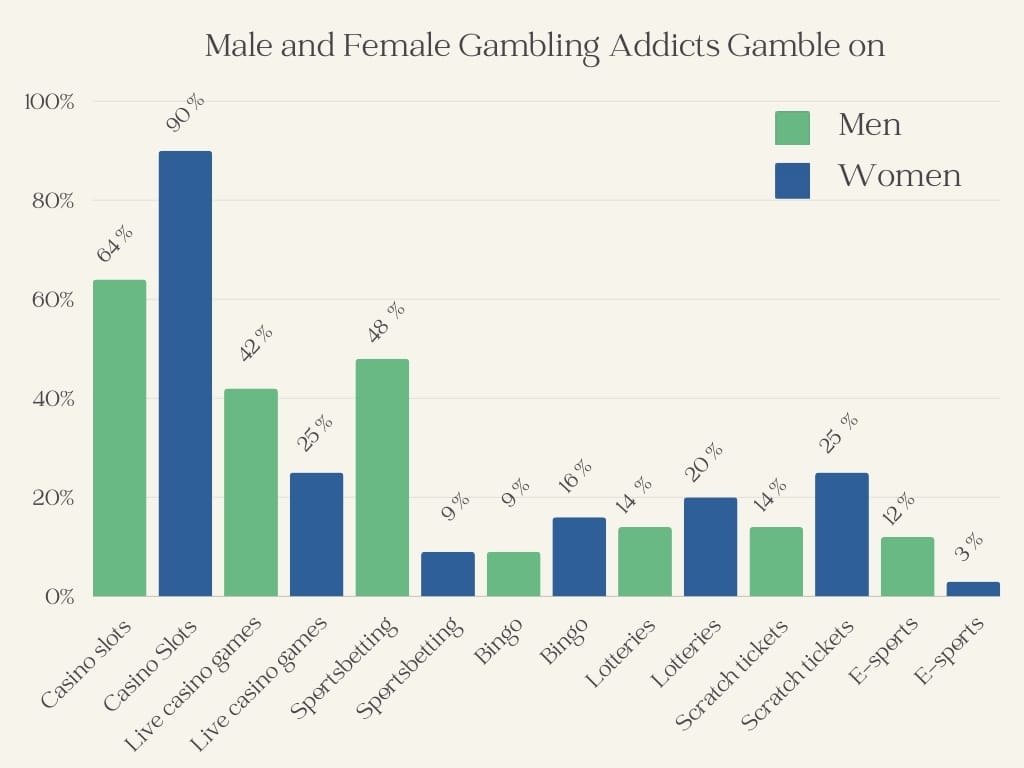
There are many differences in male gambling addicts preferences compared to female problem gamblers. 90% of female gambling addicts play slot machines and 64% of the male. Men gamble more on live casino games (42%) compared to women (25%).
The biggest gap between male and female gambling addicts is sportsbetting. Only 9% of women bet on sports, while 48% of the men engage in sportsbetting.
Women gamble more than men on Bingo (16% compared to 9%), Lotteries (20% compared to 14%), and Scratch Tickets (25% compared to 14%). E-sports is more popular among men (12%) than women at (3%).
Extra Sources
PGI (2021) – 2021 Statewide Assessment of Gambling and Problem Gambling in Illinois
Potenca (2001) – Gender-Related Differences in the Characteristics of Problem Gamblers Using a Gambling Helpline – Marc N. Potenza, M.D., Ph.D., Marvin A. Steinberg, Ph.D., Susan D. McLaughlin, M.P.A., Ran Wu, M.S., Bruce J. Rounsaville, M.D., and Stephanie S. O’Malley, Ph.D.